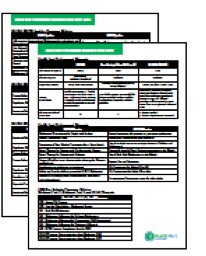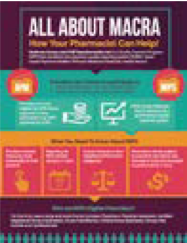How to help prescribers with quality measures
Clinical Performance

Build stronger partnerships by helping prescribers with MACRA metrics
In brief:
- Prescribers care how they perform on key measures, especially MACRA.
- The reason: their score impacts their payment.
- Many prescriber measures are directly related to pharmacy.
- This means pharmacists can impact a prescriber’s performance and payment.
- The result: many prescribers are open to partnering with community pharmacies.
Pharmacies want to build partnerships with prescribers.
Prescribers want to perform well on their key performance measures.
Achieving both is possible. In fact, they are related. Through partnerships, pharmacies can help prescribers perform well on their key measures.
Why prescribers care about quality measures
There are several performance measures for prescribers. Important measures include HEDIS, Star Ratings and MACRA.

While all of these measures are important, of particular interest to prescribers is MACRA.
MACRA is the Medicare Access and CHIP Reauthorization Act of 2015. MACRA created the Quality Payment Program, which changes how Medicare rewards clinicians for value over volume.
MACRA streamlines multiple quality programs under the Merit-Based Incentive Payments System (MIPS) and provides bonus payments for participation in some payment models.
Under MIPS, providers are scored based on quality, advancing care information, improvement activities and cost. From 2017 to 2022 the weighting of these factors changes (shown below).1

Prescribers care about MIPS because their score can impact their payment. In 2019 MIPS can adjust payments +/- 4%. This increases to +/- 9% in 2022.2

How pharmacists can help prescribers
Pharmacists can impact prescribers’ quality measures because many performance measures are directly related to pharmacy.

* Reviewed metrics for direct impact by pharmacy. Other metrics may be impacted indirectly.
**Reviewed QPP metrics. Cost measures may also have Rx spend impact.
Provided below are examples of pharmacy-related MIPS measures. These include both quality measures and measures of improvement activities.

Partnering with prescribers
Because of the importance of pharmacy-related measures on MIPS scoring and payment, prescribers are increasingly receptive to partnering with community pharmacists. Pharmacies can work with providers to:
- Provide medication reconciliation post-discharge and medication management
- Make sure prescriptions are filled, avoiding gaps in care
- Identify non-adherent patients and work to improve adherence
- Ensure that immunizations are up-to-date for children, adolescents and adults
- Help with improvement activities
In partnering with prescribers, pharmacists need to:
- Explain how your pharmacy can help address all pharmacy-related measures
- Detail the results you can help providers achieve, while saving them time
- Discuss the best workflows and processes for sharing information

 |
- Health Mart University℠ CEs.
- Provider Quality Measurements: What Pharmacists Need to Know (17 minutes)
- Prescriber Relationships: Partnering to Improve Performance (20 minutes)
- Thrive case study

